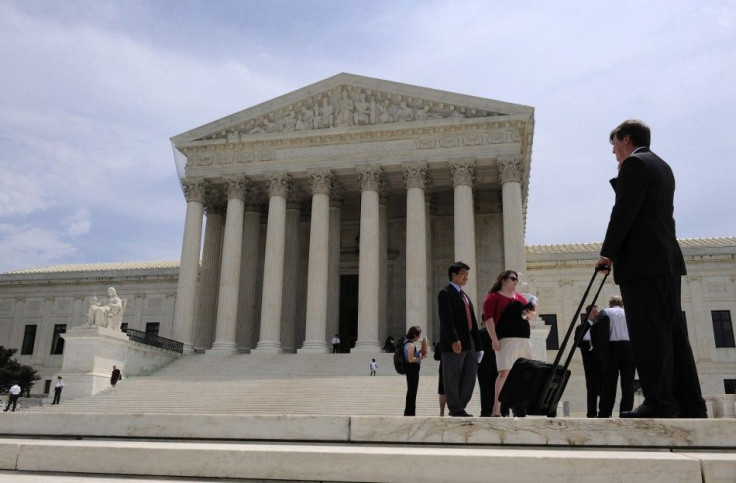US Supreme Court Blocks Part Of Immigration Law, Keeps Police Checks

The U.S. Supreme Court ruled that federal law invalidates several portions of Arizona's tough immigration law but kept in place a controversial provision requiring police officers to check the status of immigrants they believe to be in the country illegally.
The Obama administration's case against the law revolved around the argument that the federal government has the sole responsibility to enforce immigration laws. Arizona's law improperly attempted to assert an authority that belongs exclusively to the federal government, the Department of Justice argued.
The court agreed with the administration on three of four provisions: one that makes it a state crime for immigrants to not carry documentation; one that makes it a state crime for undocumented immigrants to work; and one that allows police officers to make a warrantless arrest if they believe someone has committed a crime that would be grounds for deportation.
But the Supreme Court upheld the law's most divisive piece, a measure mandating that police officers follow through on suspicions that someone they detain or stop is undocumented. Opponents argued that provision would lead to racial profiling and made local law enforcement an arm of Immigration and Customs Services.
Immigration advocates hailed the decision for striking down elements of the law that imposed criminal penalties for immigration violations, which are civil offenses. But the court's upholding the police checks provision was a source of dismay.
The Supreme Court has legitimized reactionary state law ordinances that encourage widespread racial profiling, multiply wrongful arrests, and spread fear in communities of color, the Center for Constitutional Rights said in a statement. Today's decision allows individual states to create a patchwork system of immigration enforcement and in effect undoes decades of precedent holding that regulation of immigration is an exclusively federal function.
Proponents of stricter enforcement cast the ruling as a victory for Arizona. The piece requiring police officers to check immigration status, section 2B, embodies the law's central premise: that Arizona has the power to target undocumented immigrants where the federal government has not. By upholding that, the Supreme Court has bolstered the argument that states have the right to take immigration matters into their own hands.
Had Arizona lost on section 2B it would have been a clear win for the White House, but Arizona got much of what it wanted with the decision today, said Jon Feere, a legal policy analyst at the Center for Immigration Studies, an organization that supports lower levels of immigration. I think the Supreme Court has made it clear that states have a significant role to play, Feere added, calling the police checks mechanism a force multiplier.
That could have implications for states that have considered passing tough new immigration laws and states that have already done so. Arizona set off a cascade of new statutes tightening immigration enforcement, from Utah to South Carolina to Alabama to Georgia. Federal judges have temporarily suspended components of some of those new laws but have been awaiting the Supreme Court's ruling before proceeding.
The Supreme Court's decision could leave those states feeling more empowered to enact harsh enforcement provisions, said Crystal Williams, executive director of the American Immigration Lawyers Association. But Williams noted that the court's decision was rendered in a way that those states, as well as Arizona, could still be struck down in the future.
It explicitly leaves the door open for future challenges, Williams said. She added that those challenges would likely argue that such laws violate civil rights, rather than again charging that they co-opt the federal government.
Immigration has emerged recently as a major issue in the 2012 presidential election, with the Obama administration issuing a directive that could allow thousands of young undocumented immigrants to avoid deportation and secure work permits. Presumptive Republican nominee Mitt Romney has denounced the order as a politically motivated decision but has consistently refused to say whether he would repeal it.
© Copyright IBTimes 2024. All rights reserved.




















